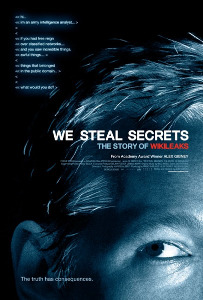Synopsis
The 1989 WANK worm attack on NASA computers, which occurred on the week the Galileo spacecraft was launched, is depicted in the film as the work of Australian hackers, including Assange. The founding of Wikileaks in 2006 is followed by coverage of several key events: its 2009–2010 leaks about the Icelandic financial collapse, Swiss banking tax evasion, Kenyan government corruption, toxic-waste dumping, Chelsea Manning's communications with Adrian Lamo, the release by Wikileaks of the Collateral Murder video, the Iraq War documents, the Afghanistan War documents, US diplomatic cables, Lamo's exposure of Manning to the FBI and the accusations of sexual assault made against Assange. Interview subjects includeJulian Assange, Heather Brooke, James Ball, Donald Bostom, Nick Davies, Mark Davis, Jason Edwards, Timothy Douglas Webster, Michael Hayden, Adrian Lamo, J. William Leonard, Gavin MacFadyen, Smári McCarthy, Iain Overton, Kevin Poulsen and Vaughan Smith. [5]
Production
Assange did not participate in the production, so previously recorded interviews were used. [6] Manning was also unavailable. [7] John Young and Deborah Natsios contributed contacts and research material, but declined to be interviewed for the film upon learning it was tentatively titled "Unnamed Wikileaks Project". [8] About 35 minutes of chat animations, headline effects, and other visual effects were designed and rendered by Framestore in New York. [9]
WikiLeaks published a transcript of the film, annotated with comments by WikiLeaks, which it said were corrections. [10] [11] Director Gibney responded that the transcript released by Wikileaks was incomplete, lacked Private Manning's words, and was from an unreleased, incomplete version of the film. [12] Later, Gibney published his own annotated version of the WikiLeaks transcript, responding to the criticisms made by Wikileaks. One of the points mentioned by Wikileaks in its annotated transcript was the possible existence of a sealed US indictment against Assange. Associate Producer Javier Botero said, "The sealed indictment has been a huge part of Assange's arguments about an American-Swedish conspiracy. He also brings it up at several points in his annotations as key evidence for why our film is wrong. But the whole thing is just based on one boastful line in a 2011 leaked email from an ex-government official; no other evidence has ever come out." [13] [14]
According to the film's executive producer Jemima Khan, We Steal Secrets was "denounced before seeing" by Assange, [15] who tweeted "an unethical and biased title in the context of pending criminal trials. It is the prosecution's claim and it is false". [15] Khan said that Assange told her, "If it’s a fair film, it will be pro-Julian Assange." [15] [16] [17] Khan asserted the title was based on a quote in the film "from Michael Hayden, a former director of the CIA, who told Gibney that the US government was in the business of 'stealing secrets' from other countries". [15]
Reception
Wikileaks criticised the film for containing dozens of factual errors and instances of "sleight of hand". It also criticised the film's depiction of Chelsea Manning's decision to leak US military and diplomatic documents as "a failure of character, rather than a triumph of conscience". [22]
On Rotten Tomatoes, the film has a 91% rating based on 81 reviews with an average rating of 7.94/10. The site's critical consensus reads "As fascinating as it is provocative, We Steal Secrets: The Story of Wikileaks presents another documentary triumph for director Alex Gibney, as well as a troubling look at one of the more meaningful issues of our time". [23]
The Hollywood Reporter writer David Rooney found the film to be a "tremendously fascinating story told with probing insight and complexity". [24] David Edelstein of New York magazine wrote that the film is a "twisty, probing, altogether enthralling movie," adding that it is "a documentary with the overflowing texture of fiction." [25] Steven Rea of The Philadelphia Inquirer , who calls the film "riveting and revelatory," notes that the director "lines up an A-list of experts, observers, cohorts, and adversaries, tracing how Assange's and Manning's worlds collide - virtually, and violently - and how a noble quest for transparency and truth turned into a tale of conspiracy and paranoia." [26]
Conversely, The Guardian's Jeremy Kay gave the film 3/5 stars and wrote that "[i]t's probably too soon for a meaningful perspective on the WikiLeaks saga", [6] and Variety's Peter Debruge found the film "dramatically lacking" a central core conflict, especially when compared with Gibney's previous work, and ultimately found Manning's story the most compelling part of the film. [5] Similarly, Salon reporter Andrew O'Hehir claimed that many of Hedges's statements about the film are patently false and that his "alarming accusations and peculiar misreadings of the film" are "an attempt to attack Gibney's integrity and sabotage his reputation". [27]
Robert Manne, who was interviewed in the film and had a written debate with Gibney based on his review, [28] expressed in The Monthly that he felt it was a "superficially impressive but ultimately myopic film". [29] In a review for Truthdig , journalist Chris Hedges called the film "agitprop for the security and surveillance state," adding that it "dutifully peddles the state's contention that WikiLeaks is not a legitimate publisher and that Chelsea Manning, who passed half a million classified Pentagon and State Department documents to WikiLeaks, is not a legitimate whistle-blower." [30]
We Steal Secrets was nominated for the 2013 International Documentary Association ABC News Videosource Award, but lost to Trials of Mohammed Ali. [31]
This page is based on this
Wikipedia article Text is available under the
CC BY-SA 4.0 license; additional terms may apply.
Images, videos and audio are available under their respective licenses.
